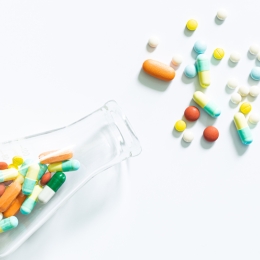If you’ve been thinking about buying a red yeast rice supplement to lower your cholesterol levels, you’ll need a lot of luck on your side. That’s because you won’t really know what you’re getting.
These supplements are produced by fermenting rice with various strains of a yeast that makes monacolin K, which is identical to lovastatin. That’s the active ingredient in the prescription statin drug Mevacor.
Red yeast rice with enough monacolin K can lower LDL cholesterol levels, but it is difficult to identify a product with enough.
Research shows a complete lack of consistency
In one study, researchers at Harvard University and the University of Mississippi bought 28 brands of red yeast rice from Walmart, Whole Foods, Walgreens, and GNC and measured how much monacolin K they contained.
Two brands didn’t contain any at all.
In the 26 that did contain at least some monacolin K, the amounts ranged more than 60-fold among brands. Some had barely any, some had a lot. Six of the brands, in fact, had more of the statin than what the Food and Drug Administration considers legal for a dietary supplement.
And consumers following the different dosages recommended on the labels could get 120 times more monacolin K from one product than from another. Not good.
Since none of the red yeast rice supplements were labeled with their amounts of monacolin K, consumers have no way of knowing whether they’re buying a potentially effective product or a dud. (The researchers did not identify the brands they tested.)
Learn more: How supplements distort science to sell
Drug interaction warnings are hard to find
We know that red yeast rice may cause some of the same side effects as statin drugs, such as muscle pain in a small fraction of users. Yet only 2 of the 28 brands the researchers tested advised consumers not to take red yeast rice if they’re also on a prescription statin. Taking both would likely increase the chances of suffering side effects.
Learn more: Can supplements cut 'bad' cholesterol?
Efficacy is hit or miss, too
How much can red yeast rice lower cholesterol levels? A meta-analysis of 13 clinical trials in people with high cholesterol levels found that the supplement lowered LDL (“bad”) cholesterol by about 40 mg/dL. Of course, these studies probably were careful to make sure the red yeast rice they were using was potent.
Consumers, on the other hand, are on their own.
These new results showing that buying red yeast rice is a crap shoot are consistent with studies by ConsumerLab.com, a supplement-testing company.
In addition, ConsumerLab found that the amount of monacolin K could fluctuate wildly from year to year even within the same brand. So even if you find one red yeast rice product that seems to lower your cholesterol levels, you won’t know if another batch of the same brand will do the same. What's more, ConsumerLab found citrinin (a toxin that may cause kidney damage) in 3 of the 10 red yeast rice supplements it tested in 2022.
That’s a lot of uncertainty—some might call it gambling—when you’re trying to control a major risk factor for heart disease, the number one killer in the United States.
So, good luck buying a red yeast rice supplement. You’re going to need it.
Who needs a nutritional supplement
USDA, CSPI, and any nutrition expert worth their credentials will tell you that eating a variety of whole fruits and vegetables is key to a healthy diet. But there are a handful of times when supplements are beneficial and necessary. For example:
- Folic acid can help people who are or may become pregnant reduce the risk of having a child with birth defects;
- A mix of nutrients (vitamins C and E, zinc, copper, and lutein) can slow vision loss in people with intermediate or advanced macular degeneration;
- Calcium and iron can help people who don’t get enough of those nutrients from food;
- Vitamin D can help people who don't get enough from fortified foods or from exposure to sunlight without sunscreen.
- Vitamin B-12 can help people over age 50 who may be unable to absorb the B-12 in foods.







